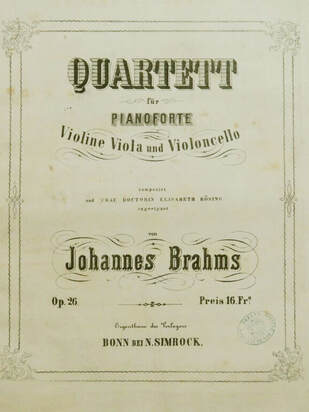 So what exactly is a piano quartet? It's not four pianos. The name denotes that a piano is one of four instruments playing together in a chamber ensemble. A traditional piano quartet consists of a piano + a string trio (violin, viola, cello). A piano quintet would be a piano + string quartet (2 violins, viola, and cello). A piano trio is understood to be a piano + violin and cello. What's a chamber ensemble? The term originated in the late 1770s. It described the small groups of players who performed in a home's chamber or salon. This was in contrast to larger ensembles that played in court ballrooms or concert halls. Franz Joseph Haydn and Wolfgang Amadeus Mozart were early proponents of chamber music. Haydn's considered the father of the string quartet (2 violins, viola, cello). He wrote 68 of them! But Haydn wrote significantly fewer piano quartets -- only thirteen. Mozart was also a prolific chamber music composer. Before he died at age 35, he had written 23 string quartets, but only two piano quartets. The first, composed in 1785 was deemed too long and too difficult to play. Mozart wrote a second, simpler one in 1786. Modern players consider both masterworks. Other composers have written piano quartets. Ludwig van Beethoven and Felix Mendelssohn wrote four each. Johannes Brahms and Robert Schumann each composed three. Antonin Dvorak and Gabriel Faure only managed two apiece. But all are standard repertoire. And many other composers have contributed to the genre. What can I expect to hear?
The essence of chamber music is collaboration and dialogue. You can expect to hear sections where the piano and strings play in opposition. You'll also hear each individual instrument taking an idea and handing it off to the others. You may hear each instrument take a solo, supported by the other three. You'll even hear duets between two of the instruments. Examples of all these combinations can be found in the video above. The piano has a wide range of 88 notes. The three stringed instruments have overlapping ranges, and combined they rival the piano's. So there's a lot for a composer to work with -- and the best take full advantage of it! When do I applaud? That question makes classical music more intimidating than it should be. Up until the early 20th Century, audiences applauded whenever they heard something they liked. Sometimes it was at the end of a section, sometimes in the middle. The way audiences still do for virtually every other genre of music. Somehow, a tradition arose that one should only applaud at the very end of the work, so as not to break the mood. Most piano quartets have more than one movement, though, so it's sometimes not obvious when that is. Think of movements like chapters in a book. Each movement has a beginning and an end, but it makes up part of the overall piece. Movements carry the narrative forward. Some are short, some are long. First movements are usually the most dramatic to set the stage. Final movements are generally fast and furious to end on a high. Second movements are normally slow and lyrical. Third movements (if present), are often light and dance-like. Each movement has a defined start and stop. When it ends, there's usually a pause (sometimes a long one if the musicians have to retune). Then the next movement starts. So how do you know when the piece finally ends? If there's a program, the movements are usually listed. So you could follow along that way. Personally, I recommend just enjoying the music. Don't sweat the "rules" If you applaud at the end of a movement because you're moved to -- don't worry. Your genuine response to the music will be appreciated by the musicians. Want to wait until the end, but aren't quite sure which stopping point is the final one? Relax. The musicians will let you know when it happens. If they're just stopping between movements, the musicians usually stay poised to play. When they finish the piece, they'll break their poses. The string players will put down their instruments and the musicians will face the audience. And then you'll know. But really. Don't worry about the "rules." Go, enjoy, and let the music sweep over you. And respond as it moves you to. That's what I do. Ralph Graves
0 Comments
|
Archives
April 2024
Categories
All
|
